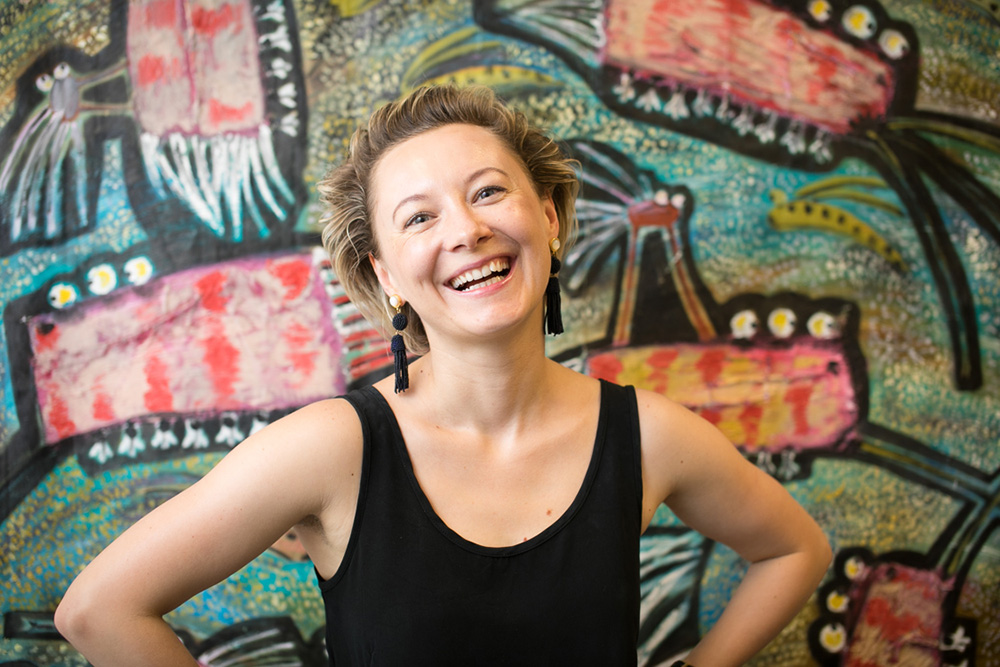Belarusian professor releases new poetry collection
By Linda B. Glaser

War and displacement, music and gardens, language and earth: These are the themes of Valzhyna Mort’s new book of poetry, “Rose Pandemic,” just released in Belarus, her native country. It includes new poems as well as selected works from her two American books, “Factory of Tears” (2008) and “Collected Body” (2012).
“The landscape of Belarus is burdened by silence, by the unverbalized history of war and colonization. I think of writing into that silence,” says Mort, Professor of the Practice in the Department of English. She describes “Rose Pandemic” as “trying to untie the nerves of silence.”
Mort notes that it is impossible to sum up a complicated history of a country “whose borders and occupiers shifted with the inevitable persistence of new seasons.” Cultural devastation in Belarus began in the 1930s with Stalin’s repressions. Eighty percent of people involved in literary writing and publishing were shot or sent off to Siberia before World War II.
“Until this day, there is not a single museum, not a state monument commemorating this era,” says Mort. “How does one walk through this silence? How to write about it without sentimentality, without madness, without grandiose statements? Poetic form offers a solution: precision, concision, clarity. It doesn’t tolerate approximated semantics, but asks for words sharpened to shoot into the very core of things.”
Mort writes in Belarusian and English, and while she plans an English edition of “Rose Pandemic,” it will not be an exact translation.
“The book that I’m writing, from my very first poem on, is my collected poems. It doesn’t matter what poems go in particular books; I don’t see them separate from each other. Some poets write one and the same poem their whole lives, and I’m afraid I’m one of them,” she says.
A recipient of a Lannan Foundation Fellowship, Poetry Magazine’s Bess Hokin Prize and, most recently, an Amy Clampitt Fellowship, Mort studied linguistics and pedagogy, English and French at the Minsk State Linguistic University and never thought of studying creative writing. She received her master of fine arts degree from the American University in Washington, D.C., after the publication of “Factory of Tears” in the U.S., Germany and Sweden.
“I’m not a product of an MFA system,” Mort says. “When in high school, I joined a group of young artists called Bum-Bam-Lit; we did lots of public performances and worked with visual artists. Our work was politically engaged, not just in terms of political protest, but rather in terms of stripping our literary tradition of its ideological bonds.”
In addition to her creative writing classes, Mort teaches a translation seminar she is particularly proud of. “Literary translation and poetry are relatives, because they both take language and thought to the edge of the say-able, all the way to silence,” she says. “While poetry, according to Eliot, is an argument with oneself, translation is a dialogue with a great writer, the great silent other. Can you imagine talking to Kafka? You are sharing one Rubik’s Cube with Kafka, that’s what translation is like.”
The class practices what they’re learning by translating famous and new authors. Their biggest challenge is the English they’re translating into, and that’s fine with Mort. “I want to complicate my students’ relationship with their mother tongue a little bit, make them question their relationship with English, which is very utilitarian, very uncomplicated. I want to break this idyllic harmony they have as an illusion,” she says. “At the end of this course, I want my students to feel not just that they have dug in and transformed various foreign languages, but first and foremost, they’ve transformed their English.”
Linda B. Glaser is a staff writer for the College of Arts and Sciences.
Media Contact
Get Cornell news delivered right to your inbox.
Subscribe